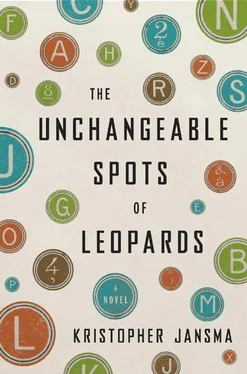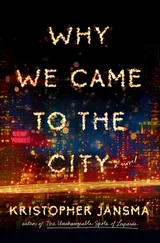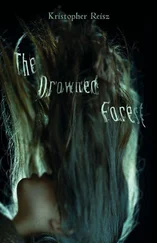“If you are in danger,” he says, nodding, “your life-soul may go away and hide. And if then, you are hurt or wounded, you will still not be killed. And then, when you are better, it will come back again.”
“That sounds like a good system,” I say.
“Well,” he laughs again. “It is all just nonsense. Whatever.”
• • •
The tiny Kumasi hotel room that Tina and I have been inhabiting is home to bugs both crawling and winged, and we pass the evening as usual, under the sanctuary of the heavy gauze mosquito netting that hangs over the bed. We eat; we make love. I drink; she smokes. We watch the black oblong shapes hum across the transparent curtain. It is too hot to sleep, but we pretend for a while that we will.
“So, what happened to Shelley?” I ask. “You were starting to tell me before.”
“Percy?” She smiles to think that I’ve been mulling it over all day.
“I didn’t realize you two were on a first-name basis.”
“Well, he wrote in his diaries that he kept seeing himself through the windows, walking around on this high terrace garden outside his house in Italy. Once or twice he chased his double through the garden, but always lost him at a low wall, which dropped hundreds of yards on the other side, down into the town. He decided never to tell Mary about it, but then one day, when she was sure Percy had gone into town, Mary thought she saw him out in the garden. She went after him — wondering what he was doing back — and chased him all the way to the wall, where he vanished.”
“Poof,” I say.
“She screams out,” Tina says, gesturing with her hands as if it is she who is doing this screaming. “And the gardener or somebody comes rushing over and says, ‘Mrs. Shelley, Mrs. Shelley. What is the matter?’”
Tina’s gardener sounds like Charlton Heston, which is to say, he sounds like every impression she does.
“And she says she’s sure her husband has just leaped over the wall to his death. And the gardener or whoever says, ‘But, no, that’s not possible. Mr. Shelley has gone into town.’ When Percy finally gets home, Mary is a wreck. Relieved to see him all right, but a wreck. And so he finally tells her that he’s seen this reflection of himself as well. And a year later, he is dead.”
“That’s quite a story,” I say. “I wonder if it’s true.”
“Oh, what does that matter?” she groans
“It’d just be nicer if it was, I think. They’re both writers, you know. Between the two of them, they could have made it all up.”
“You’re no fun.” Tina pouts, then blows a smoke ring at me.
“You like the Shelleys?”
Tina chews on her lip a moment, as if she cannot decide if she should talk to me anymore. “When Percy died,” she says at last, “they burned him on a pyre by the sea. Only a disturbed fan came rushing up and into the fire. People thought he was insane — trying to die with him, or something. But then he rolled away, all burned and on fire, with Percy’s heart in his hand. He rushed off before anyone could stop him.”
“Crazy,” I say.
“That’s not even the crazy part. Because years later, when Mary died, they found a little parcel in her desk. One of his original drafts of Adonaïs , his elegy for Keats, and wrapped up in it, this withered, burned-up lump of Percy’s heart.”
“I’ve heard that before. It’s just a myth,” I laugh.
“I think it’s the most tremendously romantic thing I’ve ever heard.”
“Would you have my heart stolen from my funeral pyre?” I ask.
“I would,” she says. “Would you have mine?”
“Of course,” I say. It is a lie — but oh, it is a great lie — one I’d love to be true. I feel bad, but not too bad, considering she’s lying as well. Jeffrey’s heart, maybe, she’d steal, but not mine. A great buzzing scarab thing goes by the netting so quickly that it makes me jump.
“Come on,” I say. “It’s too hot. Let’s go out.”
• • •
We had not known it was Saturday; O’Bryan’s has jazz on Saturday nights. We walk in and it is dark but cool, despite the crowds of people that clog the place. Someone else is in our usual booth, but we hover nearby in the hope the interlopers may leave. News of the world flashes on the muted televisions. A few men stare vacantly, waiting for the sports scores to float by at the bottom. Up on the stage, all the way across the room, a little Ghanaian ensemble is playing something all horns and bluesy, while a large dark woman moans like she’s never seen things so bad in her life. Tina gets two beers for herself and two beers for me, and we set about drinking them down.
“Get anything straight out of the old man?” she asks hopefully. “True tales of the early oeuvre of Jeffrey Oakes?”
“We only got about ten questions in before he pointed a knife at me.”
And as I say this, I see myself again, all the way across the room, leaning up against the wall in another dark corner. He — me — is listening to the singer, who is going from moan to howl now, as the song circles up and up out of the blues.
“That’s him,” I say before I can stop myself. “That’s the guy.”
He is standing with another white man, about our same age, not paying attention to me at all. He and this other man are standing very close. In the dim light I see him whispering in the other’s ear.
“He does look like you,” Tina gasps when she sees whom I mean. It takes her a moment to realize what he is doing, exactly. “Oh, dear. Darling. I think your doppelgänger is gay.”
She thinks this is very funny. I’m mostly just glad that she can see him, too.
“He was by the house today. The old man thought it was Jeffrey.”
Tina squints and tries to look through the dark throngs, rippling in time to a saxophone solo. “It’s not Jeffrey, is it?”
There’s an excited squeak in her voice, as if it were Mick Jagger or Leonardo DiCaprio standing across the bar from us. For Tina, maybe Jeffrey is of that same caliber; after all, her copy of Nothing Sacred has more dog-ears than the Westminster Kennel Club.
After a long, long pause, I say, “It’s not Jeffrey. But I think that I might know who it actually is.” As I start to cross the dark floor, Tina moves to follow me and I stop. “I need to do this alone, if that’s all right.”
“You’re joking!” she laughs. “Come on, seriously. I want to find out who he is!” I can see it in her eye — this predatory feline glint — sure that she is about to unearth some big secret.
“I’m not joking,” I say firmly. “I need to talk to him alone. Can I meet you back at the apartment?”
“Why don’t you want me to meet him?” she says, and she seems upset at my change in tone.
“It’s personal,” I say. “He’s someone I knew a long time ago and… ”
She stares at me for a while, finishes her drink, and starts in on mine.
“Why are you like this?” she asks.
It is the question — the real question — she’s been trying to ask me for weeks. Since I met her, I’d been asking myself the same thing. Watching my double at the end of the bar I begin to worry I’ll lose him again, as the people in the bar keep swelling with the sad songs coming from the stage and sighing with the sadder songs that they alone know.
“You wouldn’t believe me if I told you,” I say.
“I’d believe anything you told me,” she says. There are suddenly tears in her eyes, and I can’t look at them. But she turns away, thinking she’s robbing me of the satisfaction of seeing them.
“Well, that’s just the problem,” I snap. “You would believe anything. And I’m a liar! That’s just what I am. I lie like I’m breathing. I lie to everyone, myself most of all. But with you it’s just too easy. I can’t even stop myself, because you’ll believe any thing.”
Читать дальше











